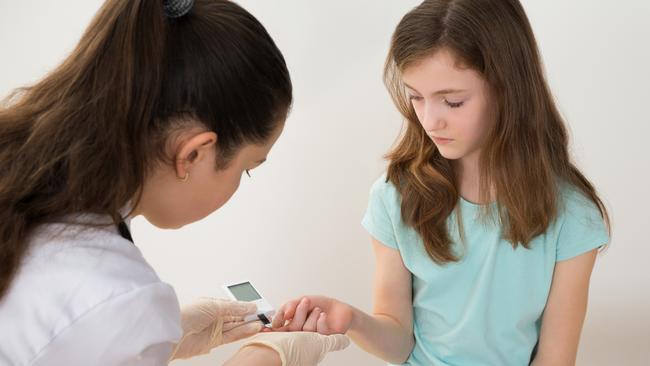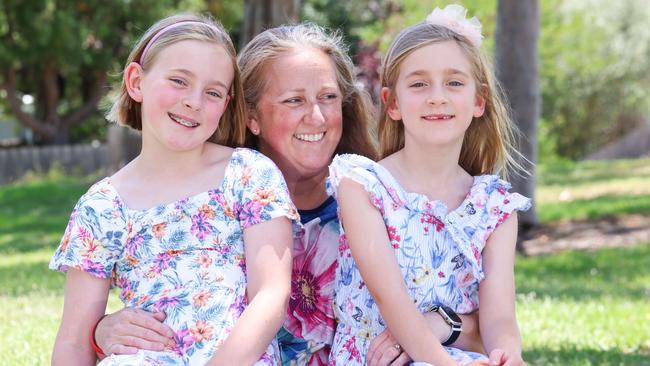The easy blood test set to change type 1 diabetes diagnosis
Melbourne scientists were confident a simple at-home blood test could accurately detect type 1 diabetes. They were right.
Victoria
Don't miss out on the headlines from Victoria. Followed categories will be added to My News.
An at-home type 1 diabetes test pioneered by Melbourne scientists is set to revolutionise global screening of the chronic disease.
In a world first, a trial of the simple finger prick blood test confirms it works, is accurate and holds the promise of a cheap, reliable population screening test that could be available within two years.
The successful results the new Melbourne-led study proves the method is feasible, tolerable for children and trustworthy.
Led by Royal Melbourne Hospital endocrinologist and Walter and Eliza Hall Institute clinical scientist John Wentworth, the newly-published study involved 100 Victorian children and young adults.
They were previously screened for type 1 diabetes at the Royal Melbourne Hospital, with half confirmed with diabetes.

The results were published in the journal Diabetes, Technology and Therapeutics.
“We knew the test worked,” Associate Professor Wentworth said. “The two things we didn’t really know was how well and also the accuracy.
“The real art is calling something positive and negative ... and that gets tricky when there are borderline results because no test is 100 per cent accurate.
“We asked how well this test can discern those results when we know what the serum testing showed in traditional assays. We then compared the results.”
Type 1 diabetes is thought to be caused by an auto-immune reaction and typically appears in adolescence. It affects about 6500 children in Australia under the age of 14 and is also diagnosed in adults.
Key, says Assoc. Professor Wentworth, is early diagnosis and prevention as there are often no symptoms in the beginnings of the disease.
For this study the participants were given a set of instructions that asked them to prick their finger, collect drops of blood and place it on a card and then mail it back for testing to identify type 1 diabetes antibodies.
“Overwhelmingly, we found this blood spot test worked and was the preferred method of detection by the families involved,” Assoc. Professor Wentworth said.
“It has the potential to decrease the cost of early diagnosis, increase the reach of screening programs and accelerate development and deployment of effective immunotherapies.”
He said being able to screen children meant the opportunity to provide treatment before irreversible damage was done to the pancreas, the organ that makes the hormone insulin which helps to control blood sugar levels.

Assoc. Professor Wentworth says the test would be of particular benefit in regional and remote areas where it can be more difficult to access testing.
“It’s not quite as sensitive as the formal sample from a vein but importantly it is very specific, which means there won’t be a lot of false positives,” Assoc. Professor Wentworth said.
“No one before has shown you can have a system where you collect in home and get an accurate result. We are world leaders in this technology.”
Professor Wentworth said he was proud of the “local research efforts” of many colleagues including first author Anna Sing who worked through her summer break sending out the tests to participants while also preparing for a violin concerto at the Sydney Opera House. She was one of three winners to perform with internationally renowned violinist Ray Chen.
The next steps, he said, will be to work with the American company that has developed the test to do a larger, more controlled study in Australia and America next year.
“I expect this (test) will be FDA-approved by 2025 and then it should be simple to get it approved in Australia.”
Long term, Professor Wentworth says, the test will likely be prescribed by a doctor or through general population screening.
“Maybe when children turn up to their first day of school or when young children are being immunised it will be offered. Ultimately that is where we are headed,” Professor Wentworth said.
“For the first time we have been able to identify this works, it is accepted and it buys time before irreversible damage has been done because once the pancreas is gone, it is gone.”
For information on diabetes testing visit: type1screen.org or atic.svi.edu.au
The volunteers

Newport mum Torie, who asked not to have her surname used, encouraged her two young daughters to be part of the trial to help others.
“I was diagnosed with type 1 diabetes as an adult, it is something in your brain every minute of every day,” Torie said.
Daughters Matilda, 9, and Alice, 6, don’t have diabetes and also hate blood tests “with a passion”.
“So they weren’t keen on jabbing their fingers to do the test,” Torie said.
“As someone who has to have jabs and fingerpick tests all the time, I thought it was pretty straightforward. For them, it was intentionally hurting themselves to get blood to come out so it wasn’t something they wanted to do.”
But she said both daughters agreed to the test to contribute to information that may one day lead to improved early treatments and interventions.
“Diabetes starts well before you get symptoms so getting in early and finding it out and changing the course, is important,” Torie said.





